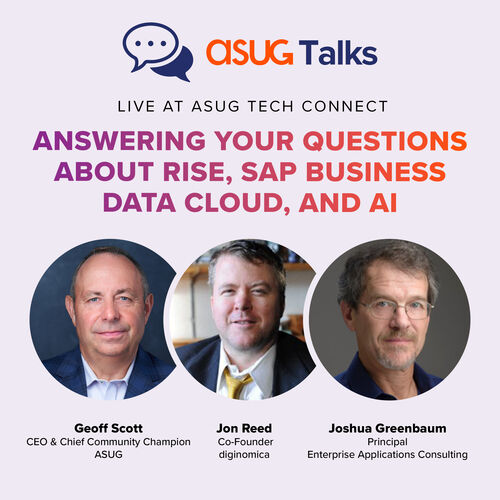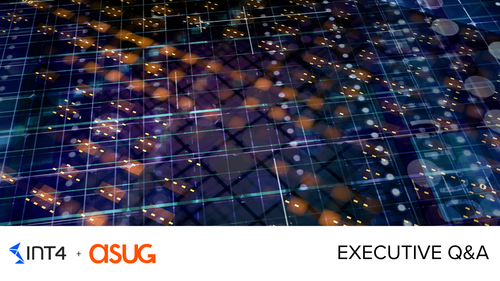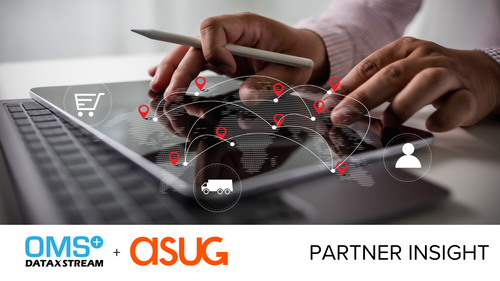Log in to save this article and keep your favorite resources in one place.

Even the most sophisticated artificial intelligence (AI) systems start out pretty dumb. They (the software-based AI engines) don’t know much because they haven’t yet been exposed to the information they need to gain the intelligence we want them to have.
This argument helps explain the relationship between AI and machine learning. AI can help organizations discover business behavior patterns and predict future outcomes. But it also can develop even higher levels of intelligence without being explicitly programmed when it is exposed to enough data. This is the process that actually allows machines to learn.
But Really, How Smart Is Artificial Intelligence?
SAP’s relationship with AI has evolved. It was just recently that SAP concentrated the bulk of its efforts in this space within SAP Leonardo design thinking. Since then, SAP has begun embedding AI functions across its product portfolio.
If SAP is known for its prowess in transactional data that resides in what are typically structured systems of record, then where can ASUG members apply SAP AI within their practical business applications?
We already know that SAP HANA can function as the data foundation for modern information management systems. But with more AI functionality now coming to market, ASUG members can look to automate invoice and payment matching without the need for human operators. When a financial system is tasked with performing this action through AI, it can then evolve with machine-learning-based intelligence and start to make recommendations to managers who can make informed business decisions. That’s just one example, but the use cases are plentiful.
Where to Use AI
ASUG members using SAP SuccessFactors for their HR and human capital management (HCM) requirements also will see an increasing number of AI options presented to them. Functions such as machine-learning-enabled resume matching and employee approval controls (e.g., for vacation requests or new laptops) are automatically rolling out within the platform.
Salespeople are using AI too. Across every industry you care to name from cake baking to oil rig management, there is always a need for procurement and sales. SAP says it is enabling “predictive lead management” through AI to give sales managers faster insight into who they’ll win their next deal with, where to find the best prospects, what value to ascribe to the potential deal, and the most opportune time to reach these prospects.
SAP also has noted that salespeople can use AI to offer automated sales discount approvals. Where online systems of customer engagement exist (from simple e-commerce sites to more complex customer relationship management systems), AI can help indicate whether a customer is entitled to a discount so they never miss it.
SAP AI for ERP
In moves that reflect SAP’s heritage in enterprise resource planning (ERP) for core customer asset management, the company also points to AI use cases in warehouse automation. Where stock and ordering systems can be categorized, compartmentalized, and automated, AI can shoulder the grunt work and leave managers to focus on activities that bring greater value to the business.
Let’s also mention physical assets such as plant machinery and other types of industrial equipment. SAP has identified AI as a key route to apply new levels of predictive maintenance and service to these areas of business so that ASUG members can dovetail their Internet of Things (IoT) investments in sensors, cameras, gauges, and other monitoring equipment with new AI advancements. SAP detailed these AI use cases in an Intelligent Enterprise eBook and noted that it is dedicated to embedding intelligent technologies within customers’ core processes.
Essentially, SAP’s approach to AI is an offering designed to allow ASUG members to sift through vast datasets of operational and transactional information to predict and adapt to certain scenarios. The company says that customers can use AI to reduce operational costs and mitigate issues proactively by:
- Increasing automation
- Optimizing asset management
- Improving operational performance
- Identifying efficiencies
- Decreasing downtime
Industry-Specific SAP AI Use Cases
We have already mentioned SAP AI in the context of manufacturing applications, sales-focused activities, firms that operate warehouse facilities, and (as two random examples) cake bakers and oil rigs. Yet these industry-specific use cases actually extend as far and wide as business itself.
“From detecting early forms of cancer or disease to analyzing MRI scans—essentially anything that’s data driven—[AI and] machine learning technology can bring huge benefits to the health care industry,” said Ewan Maalerud, member of the Digital Customer Experience team for SAP Analytics Cloud. “By analyzing large amounts of medical data, AI can help clinicians give faster and more accurate treatment to their patients, and can learn to make better decisions going forward.”
Maalerud goes on to list other examples of industry-specific SAP AI ranging from its application in cybersecurity systems to its ability to reduce energy costs through optimized asset management. Finance, government, and the environment also are noted here.
Artificial Intelligence Will Run the Intelligent Enterprise
Where SAP AI goes next will no doubt align with the company’s intelligent enterprise initiative. This will feature new areas such as SAP AI chatbots, which ASUG will look to deconstruct and examine at a future date.
AI is getting smarter and is being applied everywhere. Major changes are happening in every industry and the smart money is on how smart AI will eventually be ready to stand on its own.
Interested in learning how to use predictive maintenance and machine learning in EAM? Register for our on-demand webcast and learn where to start.
You Might Be Interested In

Log in to save this article and keep your favorite resources in one place.

Log in to save this article and keep your favorite resources in one place.

Log in to save this article and keep your favorite resources in one place.

Log in to save this article and keep your favorite resources in one place.
















